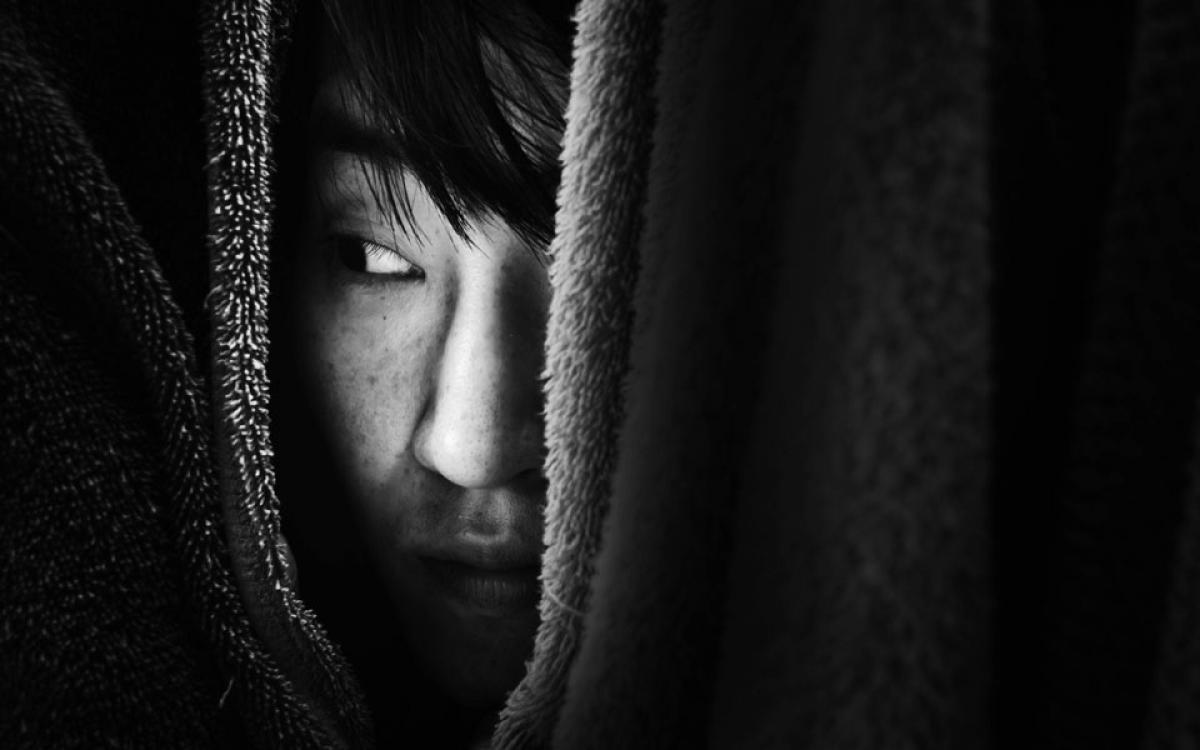It wasn’t an easy decision to press charges. First, that’s not how Anna (not her real name) rolls. She’s proud. She doesn’t like to think of herself as a victim. She also doesn’t like to speak poorly of people—even people who instigate a fight that leaves her nose bloody on the lawn in front of her kids.
Then there’s the fact of who her ex is. His surname is prominent in the Yukon, with eminence both in the political arena and on the trapline. The school that Anna’s daughters attend is named after his great-grandmother. It’s one of the reasons Anna’s father asked her not to press charges after the fight happened in June 2014.
To say Anna’s hometown—population 300—is small is an understatement. It’s a blink-and-you’ll-miss-it stop on the Klondike Highway, north of Whitehorse. “‘The families are going to gang up on you,’” Anna remembers her father telling her. “‘They’re gonna make your life hell, honey. We know the truth. You know the truth. That should be enough.’”
It wasn’t though. Anna had been in similar situations with men before and simply walked away. But it had never been this brutal. Anna’s daughters, aged 10 and 12, saw it all happen. They even ran across the street to ask neighbours for a phone to call the police.
When Anna went forward with charges, it caused waves in her community. Whenever she spoke publicly, which she does as part of her job with the local First Nation, there were crossed arms in the crowd. The neighbours her daughters ran to that night didn’t make statements to the police. Her ex-boyfriend, whose house is visible from the end of her driveway, drove by daily. It was intimidating.
Still, speaking months after the trial, Anna seems less upset by the community response than the experience of having been a complainant in the criminal justice system. Had she known what it would have been like, she might not have gone through with the process, she says, stirring sugar into her tea at a downtown Whitehorse bar. Anna is tiny in her chair. Five feet, three inches. Maybe 100 pounds. “I can see why women in these situations over and over and over again are just not doing anything. Because you’re re-victimized. You’re demoralized. You’re degraded.”
Mostly she remembers the condescending tone used by her ex’s defense team to pry into her background. She also nearly missed his sentencing—a fumble between Crown witness coordinators meant she wasn’t informed of the date. She only heard about it through a coworker.
Reem Girgrah is more specific about the details—she has 28 double-sided pages worth of notes to refer to. It’s her job to keep track of that sort of thing. Girgrah is the volunteer coordinator for Court Watch Yukon, a Yukon Status of Women Council project, which first ran as a pilot program in the early 2000s.
Back then, there had been a decrease in the number of spousal and sexual assaults reported to the RCMP, but workers in transition homes and victim services found more and more women reporting male violence. (Statistics Canada estimates 91 percent of sexual assaults aren’t reported to police.) And even when reported, the problem in the North is huge. A 2013 Statistics Canada report found the territory’s rate of violence against women was four times the national average. Another 2012 report—titled Criminal Victimization in the Territories—noted that only 20 percent of respondents believed the courts were doing a good job of helping victims.
The goal of Court Watch is to improve the experience of complainants in the legal system. Girgrah and a handful of volunteers do this by monitoring the proceedings surrounding cases of assault, domestic violence and sexualized assault, and taking detailed notes to later present to lawyers and judges. In larger southern cities, coming forward can result in intense scrutiny. But in smaller Northern communities, where anyone in town can attend the trial, and people are often interconnected through work, marriage, or blood, that attention can be more immediate and harmful.
“In a small community, the family dynamics and the ‘small p’ politics come into play,” says Charlotte Hrenchuk, YSWC coordinator. “There can be a lot of pressure to silence the victim and there can be a lot of repercussions on the victim and the victim’s family. Safety’s a huge thing.”
Court Watch has a total of seven volunteers, but it’s often Girgrah who attends bail hearings, trials, decisions, and sentencings in Whitehorse and nearby rural communities like Watson Lake, Teslin, and Haines Junction. (Personal relationships make it difficult for people to feel comfortable even volunteering for Court Watch.)
In smaller communities, where court is only held once every six weeks, the location of proceedings tend to be makeshift courthouses—arenas and public buildings, where complainants wait in hallways beside the accused. Court Watch volunteers make notes on the charges and how many supporters for both the complainant and the accused are in the courtroom. They capture just about everything that goes on. They mark down the kind of language used (are the words “romantic” or “erotic” ever used to describe a sexual assault to insinuate consensual sex) and whether lawyers appear sensitive to, and respectful of, witnesses. (During one of the very first sexual assault proceedings Girgrah attended for Court Watch, the defence opened with the quote “Hell hath no fury like a woman scorned.”)
Girgrah sits in the kitchen of a little white house near the clay cliffs in Whitehorse. The Victoria Faulkner Women’s Centre runs day programs and offers a suite for new mothers. It also provides office space to Court Watch. The buttery smell of frying onions is thick as volunteers prepare a community meal and set dishes on the table between stacks of paper.
Girgrah opens Anna’s file. Anna was living with a new boyfriend when her ex and a friend showed up in a dumptruck, tipped it out in the driveway and spilled a pink and purple stream of Anna’s daughters’ belongings she had yet to collect from his place. The two men came back later and went into Anna’s house. The fight that followed tumbled into the yard, pulling in Anna’s new partner, her ex’s friend, and two of Anna’s friends, who had been sleeping in a trailer on the property. In her decision last fall, Judge Beverley Browne said it was “impossible to measure the niceties of a brawl” like this one. Consensual: that’s the word she used for it. It’s a term Girgrah takes issue with. What’s a consensual fight anyway, she wants to know. Do you invite someone over for a beer, a barbecue, and a broken nose?
She scans the pages, shaking her head, swearing under her breath as she reads her handwriting that relays the details that make these proceedings so difficult on complainants and their families. When Anna’s young daughter broke down on the stand, confused and crying, her ex’s defence lawyer agreed it must have been tough trying to remember everything her mother had told her to say on the stand. Then there was the comment from another lawyer for the accused, after a witness remembered a piece of evidence following a break—he wished his memory could get better with age, he said.
The defence also highlighted the fact that Anna’s ex has custody of his son, owned a contracting company, and, of course, that his great-grandmother is the namesake of the local school. He also had a letter of support from a member of the Yukon First Nations Chamber of Commerce. Meanwhile, Anna was questioned about not finishing college, her two stints in rehab, and whether or not she agreed that 11:30 p.m. was too late for her daughters to have been up watching The Lion King on the night of the fight.
To the letter of the law, the defence lawyers were doing their jobs, and doing it well. (Anna’s ex received a conditional sentence after being found guilty of only one charge: unlawfully being in a dwelling.) Courts introduced a victims bill of rights in 2015, but the criminal justice system is still all about trying the accused, and it’s set up that way for a reason. A couple hundred years ago, a guilty verdict was followed by a hanging the next morning.
Vincent Larochelle, a criminal defence lawyer in Whitehorse, says the justice system is centred on the accused being judged. Though the complainant gets their day in court, he says, “it’s not meant to be a forum where the victim vindicates him or herself.”
Larochelle understands the climate in which he’s operating in the Yukon. Once a week, he has a client involved in a domestic assault case. He represents someone charged with sexual assault nearly monthly. Larochelle believes complainants need to be accommodated in order to feel comfortable coming forward, but he’s uncertain how many concessions can be made. Respect is one thing; language is another. He is respectful in his own cross-examinations, partly because he believes complainants deserve it, and partly because it’s in his best interest. You don’t score points with a judge by hammering a witness. And the more conversational you are, the less likely a witness is to see you as a threat. That’s advantageous.
When it comes to the language that Court Watch focuses on, there’s less room to accommodate. Larochelle says words are the battleground when it comes to court proceedings. He won’t call a complainant a victim during the trial. He won’t refer to an alleged rape as anything other than, at best, sexual intercourse. From a defence perspective, anything else would be unethical. Even grounds for disbarment.
He believes Court Watch plays a valuable role in making complainants feel comfortable during what is, by design, an adversarial process. But he doesn’t think it’s ever going to be a hand-in-hand process, where everyone works together to make the complainant comfortable. “There’s a fundamental tension between accommodating and respecting those wishes, and the presumption of innocence that the accused is entitled to within the criminal justice system,” he says. “I think that that can’t be resolved, to be honest.”
Girgrah hopes it can, to some degree. The findings of Court Watch data from June 2014 to May 2015 were taken from 286 proceedings in Whitehorse. They were compiled in 2015 with the help of criminologist consultants from Simon Fraser University, and presented to Yukon lawyers and judges.
Women who had come forward with charges were interviewed for the report. Three women said they did not feel safe testifying in a courtroom where the accused and his supporters were present. (One said the Crown, sensing this, suggested she focus on a cup in the room rather than the accused.) All three said they would have felt safer if given options including closed court, publication bans, or the ability to testify via closed-circuit television.
Judges in particular surprised Girgrah by telling her the report was useful because no one ever gives them feedback. She has no way of qualifying it, but Girgrah thinks there have been small changes in the words judges choose now.
Sexual and domestic assault trials are tough terrain to navigate for lawyers, judges, accused and complainants. But just as Court Watch is starting to move the needle in the Yukon, and garnering interest from organizations in Alberta, Ontario, and the Northwest Territories, it all may be coming to an end. Funding for Court Watch will lapse in December 2017. At that point, Girgrah says, the team will have to analyze its data, release a report, and wait to see what the public response is. She’s hopeful something comes through before it gets to that point though.
Anna will attest to the importance of encouraging women to come forward. She spoke publicly about her case when the National Inquiry on Missing and Murdered Indigenous Women and Girls came to Whitehorse in May. “It’s hard to stand alone,” she told the commissioners then. “It’s lonely. But that’s all right. It’s worth it.”
When it was over, even though her ex wasn’t found guilty of mischief, or assault, the trial changed things. People believed Anna’s story. And some seemed embarrassed for treating her the way they had. They talked to her about it. Told her they were proud of her. On top of that, Anna felt stronger herself for having done it. “For me, it felt like I was giving it back to them. I was the one carrying it around all those years. And then I realized a few years ago, it’s not me. It’s not me at all.”










